Warsaw Film Festival – Best Of
It was a close call for the 36th edition of the Warsaw Film Festival – less than two days ago, due to the large number of infections with the new Coronavirus, Warsaw entered the red zone, a situation that the festival missed by inches. As for myself, I could watch everything that was on my watchlist under safe conditions, as the cinemas halls were almost empty, and the audience very quiet. Being inside the old halls of Kinoteka, even made me feel like I was at Patria Cinema. Whereas outside, a dense fog flooded the dormant crown of the Palace of Culture, which seemed to change its appearance from day to day. I might have spent 10 days crossing 3 streets back and forth, but I made it up by watching over 20 films – from short films to feature and documentary films, I made my way through all sections. The five titles below are my own best of from what I’ve managed to see at the festival (I should say, not all of them were in competition sections, and I had already written about Spiral and Preparations to Be Together for an Unknown Period of Time).
- Shirley (dir. Josephine Decker)
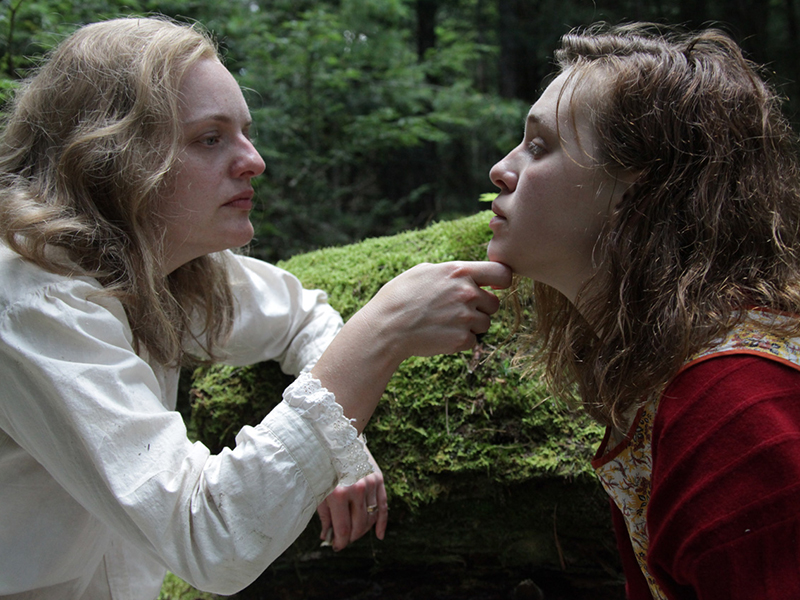
If in Madeline’s Madeline, the prior film by director Josephine Decker, an actress (Helena Howard) with post-traumatic syndrome juggles with the emotions of her mother (played by Miranda July) and her director (Molly Parker) like a devotee of the Stanislavski method, while she is trying to get in the role of a cat, you could say that Shirley is just as focused on “vampirism”. The film is a fake biopic about horror novelist Shirley Jackson (Elisabeth Moss) and her relationship with a (rather unwelcome) guest, Rose (Odessa Young), who serves as her muse, cook and guinea pig, while working on her novel Hangsaman, based on a real case of unsolved murder. There is a considerable dose of Persona and psychodrama in Shirley – if at first Shirley is static, lethargic and quite the parasite, overlooking without too much effort the escapades of her visibly more exuberant husband, with Rose in the picture she seems to have found a space where she can flourish. In Rose’s eyes, the writer’s practice of medieval witchcraft and the lack of any mental order (no wonder she always lies on the floor or in the bathtub as in a creative trance, with stockings down her legs and an open mouth) are alluring – precisely because Jackson allows herself to behave this way. For example, in an overwhelming erotic scene, the writer tells Rose about a poisonous mushroom, then swallows it in one gulp.
- Black Bear (dir. Lawrence Michael Levine)
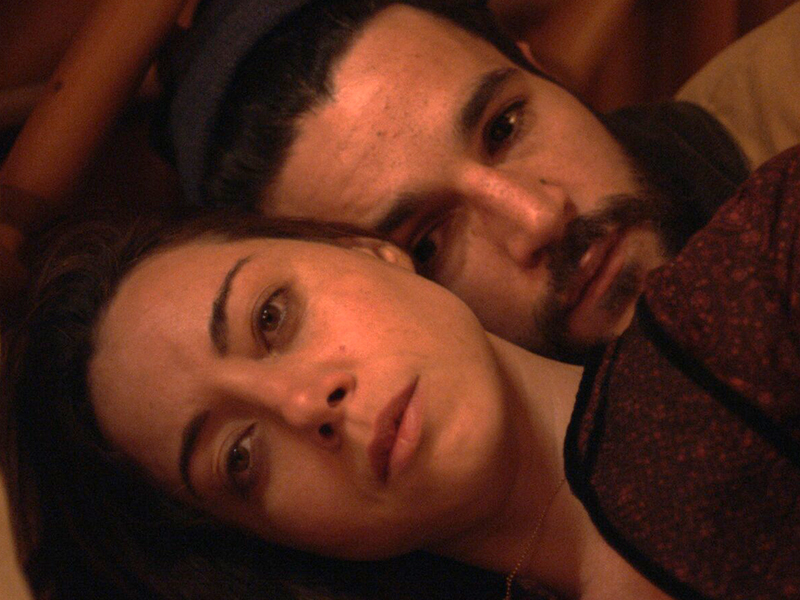
Lawrence Michael Levine’s film has a lot in common with Shirley – first, they approach a similar theme, because Black Bear is about a screenwriter who retreats into the woods, to a cottage, where she hopes to find her inspiration, and second, because it presents a very confusing erotic triangle in which their roles will be reversed one by one: Allison (Aubrey Plaza), Gabe (Christopher Abbott) and Blair (Sarah Gadon). Black Bear presents two fragments separated narratively, that describe the same events but from completely different perspectives. A black bear roaming the yard and occasionally threatening to cause some damage is actually a narrative hook – at times comic, at times horror, which says a lot about the constant changes in the film’s tone, placing itself somewhere between a meta exploration of the creative process and a psychodrama with thriller accents in which everything ignites from a feminist discussion, and depicting how far a director is willing to go with torture (speaking of method acting) in order to take his actresses to the darkest places.
- Mia Misses Her Revenge (dir. Bogdan Theodor Olteanu)
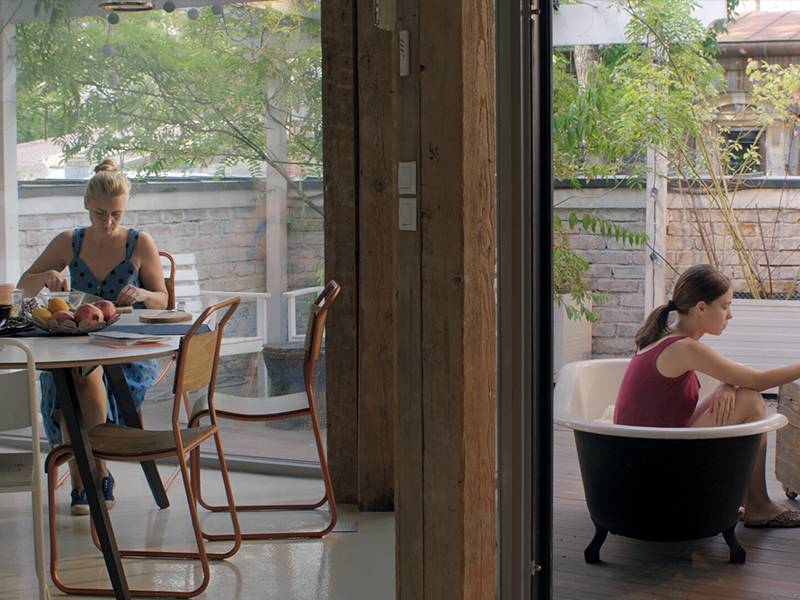
In Mia Misses Her Revenge, Mia (played by Ioana Bugarin), a film student coddled by everyone, takes a stand against any kind of misogynistic behavior coming from men in her life, after Theo, her ex-boyfriend, slaps her and accuses her of infidelity. She constantly carries a camera with herself which she uses to send scornful messages to her ex, and even swears she will hook up with whomever comes along and make a sex video to really get him mad, but in all this chaos Mia ends up missing her “revenge” for several reasons. First of all, for an emancipation movement to actually happen you need a tight-knit group, and Mia is alone against them all. Then, although it is packed up like a teenage quarrel, Olteanu never undermines Mia’s motives, it’s just that, in her desire to get justice, she ends up hurting herself, by offering her body to men around in the same way that she did before. The film offers an extremely nuanced perspective on feminism, which derives from the experiences lived by the actresses who step in front of Mia’s camera to confess different humiliating or degrading events they had with people in the industry.
Mia Misses Her Revenge presents a series of meta continuities with Olteanu’s previous film (Silvana Mihai, the protagonist of Several Conversations About a Very Tall Girl, seems to play a variation of the same role), but also other less visible “innuendos” (in some man’s apartment, a small painting by Bruegel is hanging on the wall, Hunters in the Snow, which used to be an obsession for both Tarkovsky and Lars von Trier), as well as a crass drinking game, probably improvised, in which several actresses are being blunt about who they would have sex with, marry or kill (for example, the sacred trio of the New Wave, Puiu-Mungiu-Porumboiu).
- Ghosts (dir. Azra Deniz Okyay)
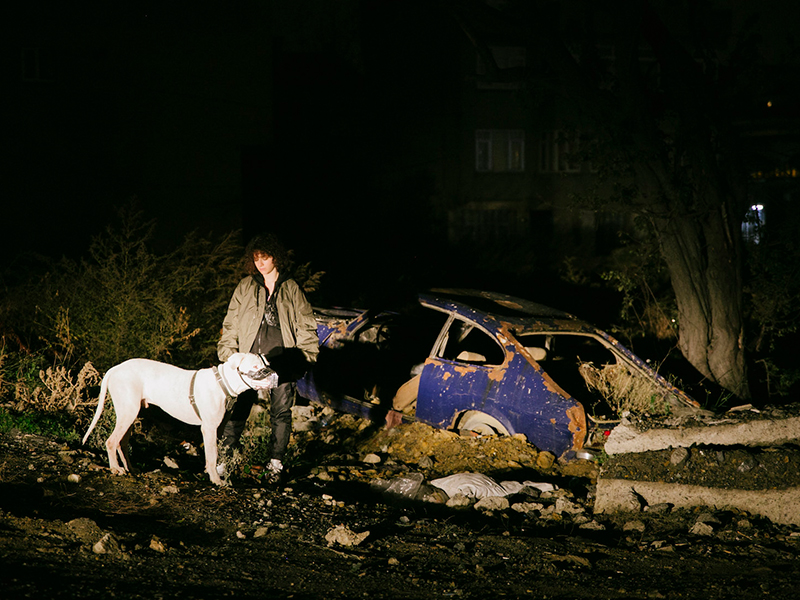
Placed in the very near future, on October 26, 2020, on a typical day in Istanbul, a power outage destabilizes the city at dusk, by blacking it out. Paradoxically, by forcing the city into complete darkness, it actually comes to life, as protests and street demonstrations arise against Erdogan. That’s one way for people to rethink their society. Deniz Okyay’s thesis is that all this is probable and inevitable and, to a certain extent, even beneficial – by transforming or helping society to rethink its values. It’s a conflict between tangible and pressing things, which are sewn into the capitalist framework (having a job, a roof over your head), and those related to mentalities – with the buildings collapsing, the patriarchy will be blown to pieces, thus leaving room for women and young people to take over. In Ghosts, there’s rather the naive fantasy that a calamity may destroy traditionalism and allow a restart. Built as a narrative puzzle of interrelated perspectives, which covers a day in the life of four protagonists, the film depicts just that, the ardent desire for change. And a world that no longer offers anything to young people – it’s no coincidence that we never see the protagonists in the quiet of their own home, but rather wandering from one place to another, just like ants.
- The Macaluso Sisters (dir. Emma Dante)
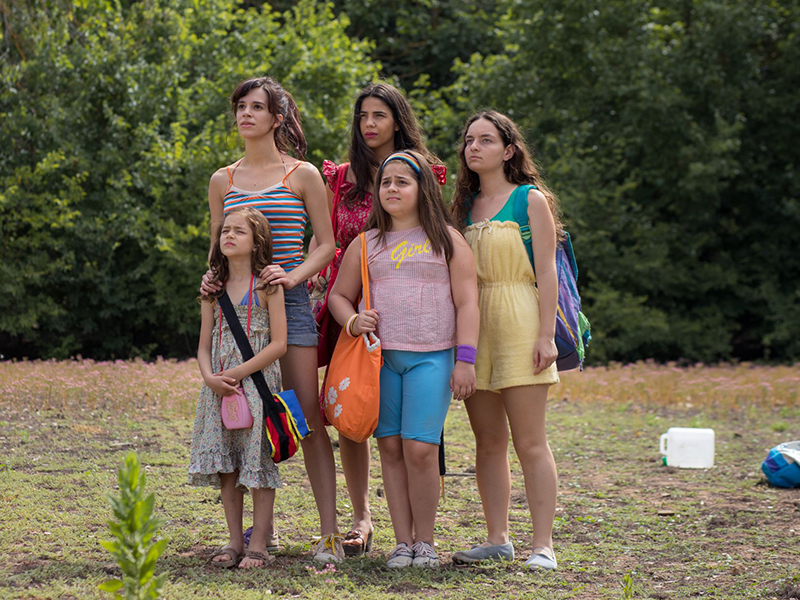
The Macaluso Sisters presents three episodes in the lives of five orphaned sisters, who spend their lives in an almost floating apartment, on the top floor, among pieces of painted furniture, dolls, unwashed dishes, and dozens of pigeons of all colors wandering around. In this constant stir, which allows no moment or space for intimacy (one of the sisters locks the apartment door to have sex with her boyfriend, and the other one is left outside, in front of the building, crying and scrolling through pictures with him), making them snap at each other, the passage of time doesn’t transform them in a definitive way, but only thickens their features. Emma Dante makes more than enough room for details and boxes of memories – she displays them in a mannerist way, and so, the whole apartment becomes in old age a museum of agony, and those who die alone here are forced to carry with them the baggage of all those left behind. In this spontaneous Peter Pan-scented musical, the characters leave their shopping bags on the ground and dance by the lake on Erik Satie’s music, and in one moment everything seems possible – the girls carry around a dinosaur egg that never hatches, just as they never seem to grow up.
Journalist and film critic, with a master's degree in film critics. Collaborates with Scena9, Acoperișul de Sticlă, FILM and FILM Menu magazines. For Films in Frame, she brings the monthly top of films and writes the monthly editorial Panorama, published on a Thursday. In her spare time, she retires in the woods where she pictures other possible lives and flying foxes.
